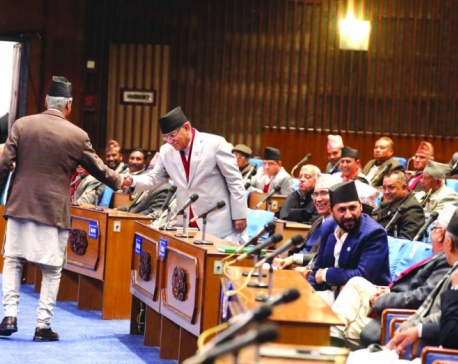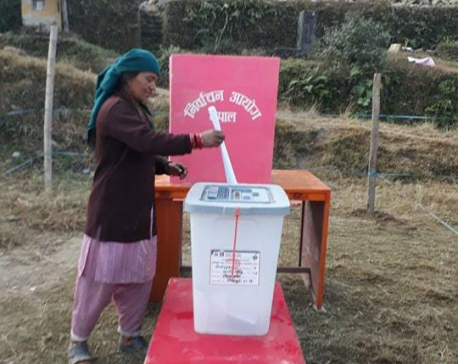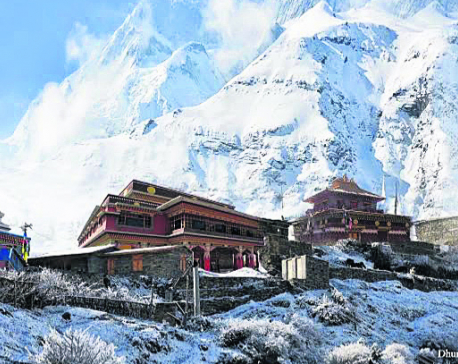
OR


Sarans Pandey
The author is an undergraduate student at Macquarie University, Sydneynews@myrepublica.com
Such is the nature of our present education system that the younger generation knows more about the policies of Obamas and Trumps than about their own MPs or the changes they have brought or proposed.
It has been more than a decade since Nepal got the title of a republic and we still find ourselves incapable of completing the democratization process that started more than half a century ago.
Going from autocracy to freedom required a great deal of courage and resistance, but these two traits alone can only liberate and not administrate. Perhaps some of us had expected that the attainment of democracy would in itself be the magic solution to all our problems. But the growing dissatisfaction that shows no signs of dissipating would suggest otherwise. This has put us in a rather precarious position, because beyond freedom there is only anarchy and before it autocracy. So where do we go from here and who are we to blame?
Politicians have been the conventional scapegoats for all that is bad in the country. It is as if we forget that politicians are as much a part of our society as the next person. We relish in the cycle of blame game; society blames the politicians, and the individual blames the society. And in the process, the individual absconds from the scene of the crime having attributed the wrongs to collective pronouns that can only be verbally persecuted and not prosecuted. Time and time again we have seen revolutions informed by democratic notions of freedom and equality, but these marches all started and ended in the streets, with individuals refusing to take these values to the place that mattered the most—their homes. Perhaps our inability to conclude the democratization process stems from the fact that we carried out this transition from autocracy the other way around. We sought for democracy in society when we couldn’t even champion it in our homes. After all, how can a country set out to promote equality when many families still refuse to lift the constraints on women that prevent them from going beyond their traditional roles? What is the point of freedom of expression when seniority alone prevails over merit and diligence? How can a society that expects children to set aside their aspirations to cater to traditional norms and social collectivism, promote individuality and free thought? It seems as if we fought for a democracy not because we believed in its principles, but simply because of our disdain of the prevailing autocratic system. Nothing in our customs and traditions is particularly conducive to the true definition of democracy. This isn’t to say that everything that we have inherited is bad. All this suggests is that our practices always have had a hierarchy of preferential treatments, right or wrong, handed out on the basis of seniority, gender, ethnicity and other demographic variables, and we quite naively expect to maintain this order in a democratic system.
Democracy can help ideas blossom, but it can also dethrone and destroy them. Nothing within the confines of this system is immune to rejection; not even culture and traditions. So, when someone goes out to the streets to sacrifice their life for democracy, they must realize that when they return home to their families, who have had their aspirations and freedom held hostage by societal norms, an act of rebellion in defiance to it is only in line with the ideals of the very system they champion. Not many are able to reconcile a paradox as such, but right or wrong, this is how democracy works.
An immutable hierarchy in a democracy cannot exist. If it does, then it’s not a democracy. With the spread of modern means of communication, more and more people are getting exposed to the Western culture, and that too at a young age. Slowly with time, every subsequent generation, partly through apathy, partly through Western influence, will be less inclined to adhere to traditional norms, which will, at the least, reshuffle that hierarchy. This means that a transition is inevitable, but the problem is there’s still no guarantee that a paradigm shift as such is going to be for the better.
A healthy democracy requires informed and empathetic citizen participation—a combination that can be hardly found together, thanks in no small part to the schooling practices in place. Our current education system is more concerned with textbook academic excellence which, despite its success in the realms of science and mathematics, fails to accommodate the political and socio-cultural realities that surround us. For the most part, it is a veritable factory specializing in the export of subservient human resource and as such it produces less people who can lead and more of those who follow. This is not surprising given that even after so many political, social and economic transitions, our education curriculum in its core, aside from the annual shuffling of prescribed textbooks, has mostly remained unscathed—all the way from despotism to democracy. They fail to adequately dwell and discuss on topics like national history, cultural origins and constitution, subjects without whose knowledge at the right age, the completion of civic duty solely based on international examples can lead to unfortunate outcomes.
This is a problem that many scholars associate with isomorphic mimicry. Such is the nature of our present education system that the younger generation knows more about the policies of Obamas and Trumps than they do about their own MPs or the changes they have brought or proposed. There is this branching away in the earlier years of schooling where one group of people gravitate towards the English language, thereby subsequently adopting the culture associated with it. The problem with a cultural conversion as such, despite the individuality and other doctrines of freedom it invites, is the rise of ‘copy and paste’ brand of activism that is oblivious to the historical and geographic complexities of importing outrage and solutions.
What makes the situation worse is the lack of an informed opposition. The ones playing that role, unfortunately, are the ones who peddle blind nationalism and isolationism to reject the influx of ideas without reason, no matter how beneficial they maybe. Of course, there are rational voices out there in the middle, but more often than not, they are drained by the loudness of the two extremes. As it stands, representatives from one faction want selective democracy that provides protective custody to some autocratic elements of a patrimonial society; the other faction seems to be in pursuit of a utopian version of democracy that erases demographic distinctions and historical progression to enforce homogeneity.
In this tug of war, the sooner a reconciliatory path is proffered, the smoother will be the democratization process and the stronger will be the democracy. But without a radical upheaval in the education sector that further segregates our society beyond the preexisting demographic variables, the differences are only going to get more irreconcilable with time.
You May Like This

Is The Future of Nepali Political Parties Doomed?
Nepal, a landlocked country situated in the Himalayas, has witnessed significant political changes and challenges over the years. With a... Read More...

Why is democracy failing to deliver?
Democracy, "of the people, by the people, and for the people” cannot tolerate political nexus with foreign agents, syndicate, nepotism,... Read More...

Dhurmus, Suntali to build ‘a Nepal within Nepal’
KATHMANDU, June 5: After successfully completing three settlement projects for earthquake victims and other communities, the actor couple Sitaram Kattel (Dhurmus)... Read More...





Just In
- CM Kandel requests Finance Minister Pun to put Karnali province in priority in upcoming budget
- Australia reduces TR visa age limit and duration as it implements stricter regulations for foreign students
- Govt aims to surpass Rs 10 trillion GDP mark in next five years
- Govt appoints 77 Liaison Officers for mountain climbing management for spring season
- EC decides to permit public vehicles to operate freely on day of by-election
- Fugitive arrested after 26 years
- Indian Potash Ltd secures contract to bring 30,000 tons of urea within 107 days
- CAN adds four players to squad for T20 series against West Indies 'A'













Leave A Comment